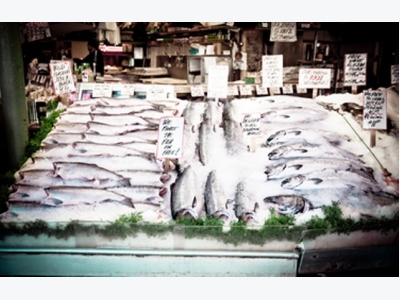Copper River salmon hits market at record-high prices

Retail and restaurant buyers who want in on the first Copper River salmon of the season are paying record prices this year.
While the first Alaskan salmon of the season, which started 18 May, is always coveted by buyers and consumers willing to pay top dollar, this year’s perfect market conditions have caused all-time highs of around USD 8 (EUR 7.12) per pound at the dock for sockeyes and between USD 10.50 (EUR 9.35) and USD 11.15 (EUR 9.92) per pound for king salmon.
Pike Place Fish at Pike Place Market in Seattle, Washington, U.S.A., was retailing the first sockeye salmon for USD 35.99 (EUR 32.04) a pound and king salmon from Copper River for as much as USD 74.99 (EUR 66.75) for fillets, according to news reports. And numerous Seattle restaurants, including Ivar’s Acres of Clams, Elliott’s Oyster House; Seastar Restaurant and Raw Bar, and Ray’s Boathouse are carrying the delicacy.
“According to everyone I’ve spoken to, both inside and outside of our company, these are record high prices,” Cassandra Squibb, chief marketing officer for Copper River Seafoods in Anchorage, Alaska, United States, told SeafoodSource.
Favorable market conditions for salmon are being caused by low frozen wild salmon inventories and small overall wild salmon projections for sockeye and king hauls this season. Copper River salmon projections are nearly 20 percent lower, at just 4,000 kings and 889,000 sockeyes, according to the Alaska Department of Fish and Game.
The overall sockeye salmon catch in Alaska is expected to drop from more than 52.8 million fish last year to nearly 40.9 million fish this year, according to Alaska Department of Fish and Game projections, while king salmon will drop from 401,000 harvested in 2016 to a projected 80,000 fish in 2017.
“There is very little [frozen inventory] left. We are all anxiously awaiting for the new season,” Steven N. Chartier, vice president of sales and marketing for Peter Pan Seafoods in Seattle, told SeafoodSource at the 2017 Seafood Expo North America in Boston, Massachusetts in late March.
In addition to pressure on supply, sockeye salmon demand is very high.
“Domestic U.S. consumer demand for wild Alaska salmon is very strong, and retailers and foodservice operators know that Alaska salmon is a must-have item during the fresh season from May to September,” Squibb said.
As a result, many larger U.S. retailers — along with upscale restaurants —are featuring Copper River salmon this week.
While Copper River prices typically start declining within two or three weeks, Squibb foresees strong prices for awhile.
“They will likely remain high until wild Alaska salmon from other regions of the state flow into the marketplace, given the current inventory situation,” she said.
Related news
Tools

Phối trộn thức ăn chăn nuôi

Pha dung dịch thủy canh

Định mức cho tôm ăn

Phối trộn phân bón NPK

Xác định tỷ lệ tôm sống

Chuyển đổi đơn vị phân bón

Xác định công suất sục khí

Chuyển đổi đơn vị tôm

Tính diện tích nhà kính

Tính thể tích ao



 Atlantic redfish fishery achieves MSC certification
Atlantic redfish fishery achieves MSC certification  Students experiment with mussel aquaculture
Students experiment with mussel aquaculture